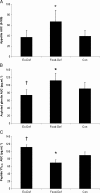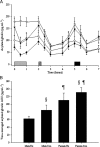Appetite and Energy Intake Responses to Acute Energy Deficits in Females versus Males
- PMID: 26465216
- PMCID: PMC5642317
- DOI: 10.1249/MSS.0000000000000793
Appetite and Energy Intake Responses to Acute Energy Deficits in Females versus Males
Abstract
Purpose: To explore whether compensatory responses to acute energy deficits induced by exercise or diet differ by sex.
Methods: In experiment one, 12 healthy women completed three 9-h trials (control, exercise-induced (Ex-Def) and food restriction-induced energy deficit (Food-Def)) with identical energy deficits being imposed in the Ex-Def (90-min run, ∼70% of V˙O2max) and Food-Def trials. In experiment two, 10 men and 10 women completed two 7-h trials (control and exercise). Sixty minutes of running (∼70% of V˙O2max) was performed at the beginning of the exercise trial. The participants rested throughout the remainder of the exercise trial and during the control trial. Appetite ratings, plasma concentrations of gut hormones, and ad libitum energy intake were assessed during main trials.
Results: In experiment one, an energy deficit of approximately 3500 kJ induced via food restriction increased appetite and food intake. These changes corresponded with heightened concentrations of plasma acylated ghrelin and lower peptide YY3-36. None of these compensatory responses were apparent when an equivalent energy deficit was induced by exercise. In experiment two, appetite ratings and plasma acylated ghrelin concentrations were lower in exercise than in control, but energy intake did not differ between trials. The appetite, acylated ghrelin, and energy intake response to exercise did not differ between men and women.
Conclusions: Women exhibit compensatory appetite, gut hormone, and food intake responses to acute energy restriction but not in response to an acute bout of exercise. Additionally, men and women seem to exhibit similar acylated ghrelin and PYY3-36 responses to exercise-induced energy deficits. These findings advance understanding regarding the interaction between exercise and energy homeostasis in women.
Figures




References
-
- Borer KT, Wuorinen E, Chao C, Burant C. Exercise energy expenditure is not consciously detected due to oro-gastric, not metabolic, basis of hunger sensation. Appetite. 2005; 45: 177– 81. - PubMed
-
- Brechet S, Plaisancié P, Dumoulin V, Chayvialle JA, Cuber JC, Claustre J. Involvement of beta1- and beta2- but not beta3-adrenoceptor activation in adrenergic PYY secretion from the isolated colon. J Endocrinol. 2001; 168: 177– 83. - PubMed
-
- Buffenstein R, Poppitt SD, McDevitt RM, Prentice AM. Food intake and the menstrual cycle: a retrospective analysis, with implications for appetite research. Physiol Behav. 1995; 58: 1067– 77. - PubMed
-
- Caudwell P, Gibbons C, Finlayson G, Näslund E, Blundell J. Exercise and weight loss: no sex differences in body weight response to exercise. Exerc Sport Sci Rev. 2014; 42: 92– 101. - PubMed
Publication types
MeSH terms
Substances
Grants and funding
LinkOut - more resources
Full Text Sources
Other Literature Sources

